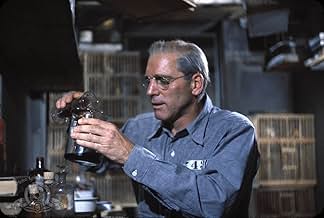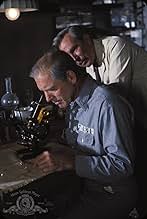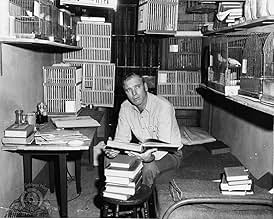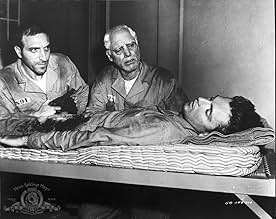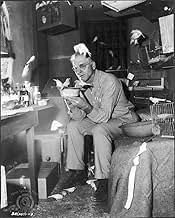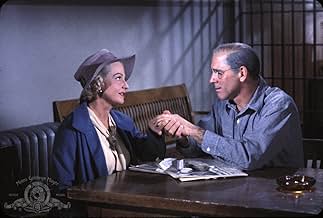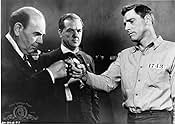A surly convicted murderer held in permanent isolation redeems himself when he becomes a renowned bird expert.A surly convicted murderer held in permanent isolation redeems himself when he becomes a renowned bird expert.A surly convicted murderer held in permanent isolation redeems himself when he becomes a renowned bird expert.
- Director
- Writers
- Stars
- Nominated for 4 Oscars
- 4 wins & 12 nominations total
Robert Bailey
- Reporter on Dock
- (uncredited)
Nicky Blair
- Inmate
- (uncredited)
John Burnside
- Captain of Marines
- (uncredited)
Robert Burton
- Sen. Ham Lewis
- (uncredited)
Mushy Callahan
- Inmate
- (uncredited)
Jimmy Casino
- Inmate
- (uncredited)
James Cavanaugh
- Guard
- (uncredited)
- Director
- Writers
- All cast & crew
- Production, box office & more at IMDbPro
7.820.9K
1
2
3
4
5
6
7
8
9
10
Featured reviews
Finding a Purpose of Life
In 1912, the notorious and violent prisoner Robert Franklin Stroud (Burt Lancaster) is transferred to the Leavenworth Prison convicted for murdering a man. When a guard cancels the visit of his mother Elizabeth Stroud (Thelma Ritter) due to a violation of the internal rules, he stabs and kills the guard and goes to trial three times. He is sentenced to be executed by the gallows, but his mother appeals to President Woodrow Wilson that commutes his sentence to life imprisonment. However, the warden Harvey Shoemaker (Karl Malden) decides to keep Stroud in the solitary for the rest of his life.
One day, Stroud finds a sparrow that has fallen from the nest on the yard and he raises the bird until it is strong enough to fly. Stroud finds a motivation for his life raising and caring birds and becomes an expert in birds. He marries Stella Johnson (Betty Field) and together they run a business, providing medicine developed by Stroud. But a few years after, Stroud is transferred to Alcatraz and has to leave his birds behind.
"Birdman of Alcatraz" is an impressive film based on a true story of a prisoner that finds a purpose of life raising and caring birds and becoming a recognized ornithologist by himself. Burt Lancaster has a top-notch performance in the role of Robert Franklin Stroud and the footages with birds are impressive. However, it seems that Stroud did not have the glamour of the character performed by Burt Lancaster and was actually a psychopath. My vote is nine.
Title (Brazil): "O Homem de Alcatraz" ("The Man of Alcatraz")
One day, Stroud finds a sparrow that has fallen from the nest on the yard and he raises the bird until it is strong enough to fly. Stroud finds a motivation for his life raising and caring birds and becomes an expert in birds. He marries Stella Johnson (Betty Field) and together they run a business, providing medicine developed by Stroud. But a few years after, Stroud is transferred to Alcatraz and has to leave his birds behind.
"Birdman of Alcatraz" is an impressive film based on a true story of a prisoner that finds a purpose of life raising and caring birds and becoming a recognized ornithologist by himself. Burt Lancaster has a top-notch performance in the role of Robert Franklin Stroud and the footages with birds are impressive. However, it seems that Stroud did not have the glamour of the character performed by Burt Lancaster and was actually a psychopath. My vote is nine.
Title (Brazil): "O Homem de Alcatraz" ("The Man of Alcatraz")
Story of one man who has many others like him.
John Frankenheimers 1962 film about a convicted double murderer who turns his half-life into something meaningful by becoming an expert on the diseases of birds. Although this is not a completely accurate tale of Robert Stroud who became known as The Birdman of Alcatraz the performance of Burt Lancaster makes it a classic film of the human-interest story genre. Genuine WWII hero turned actor Neville Brand likewise turns in a strong performance as a stern yet sympathetic guard at the Leavenworth Penitentiary. Karl Malden is cast as the by the book bureaucratic prison official who's life continues to cross paths with the incarcerated Stroud. Veteran character actress Thelma Ritter is Strouds over protective mother who will do anything for her loving son realizing that where he is is probably the best place for him.
The film strangely shows the mental capabilities of a person and how much someone can achieve when one wishes to. The Stroud character has only an elementary school education at the films beginning yet applies himself to obtain knowledge equal to that of a college educated individual.
Although the story takes place in a prison this is not just a prison picture but more of a story of one man conquering his own ignorance by reaching into himself and casting out the demons that put him in the situation that he must live with. There are perhaps many such people in this countries prisons who have done similar as the main character in this movie.
The film strangely shows the mental capabilities of a person and how much someone can achieve when one wishes to. The Stroud character has only an elementary school education at the films beginning yet applies himself to obtain knowledge equal to that of a college educated individual.
Although the story takes place in a prison this is not just a prison picture but more of a story of one man conquering his own ignorance by reaching into himself and casting out the demons that put him in the situation that he must live with. There are perhaps many such people in this countries prisons who have done similar as the main character in this movie.
A fine film from a true star.
There are many combinations in Hollywood that produce fine work; and, then, there are those that produce tremendous work. Directors and actors can often be at odds, but when they are in sync, something wonderful can come of it. Hitchcock made classics with Jimmy Stewart and Cary Grant; Scorcese and Deniro transcend their contemporaries; and Burt Lancaster and John Frankenheimer made great movies together.
I've always liked Burt Lancaster. At first, I had only seen his swashbucklers and his westerns. But, as I discovered his dramas, my respect grew. Lancaster was the perfect leading man. He was tall, good looking, charming, and loaded with charisma. What's more, he had talent. He could turn out a pirate yarn or play a con artist who finds love; a marshall in the most famous gunfight, or a general who abandons his oath; a ghost of a doctor who gets that one at-bat, or a prisoner who becomes an expert on birds. Lancaster is brilliant in this film.
Lancaster was more than a movie star; he was an actor. He never sought the easy route, his life had never been easy. Maybe that's why his movies stand out. Nothing good ever comes easy.
Lancaster presents a brilliant portrayal of Robert Stroud. Whether it is historically accurate or not is beside the point. Lancaster represents the indomitable human spirit; no matter what challenge life throws at him, he rises above. Lancaster is understated in this role, but so powerful. He doesn't need method or make up or any tricks; just his humanity.
So many movies shine due to the presence of Lancaster; but his collaborations with Frankenheimer shine brightest. Frankenheimer is highly underrated, due to his later work; but, there was a period when he was one of the best. The Manchurian Candidate, Seven Days in May, The Train, and Birdman of Alcatraz are clear examples of his talent. Do yourself a favor, when you see a movie in the video store, or on tv, look for the names Frankenheimer and Lancaster. If you find them, watch the movie. You'll be glad you did.
I've always liked Burt Lancaster. At first, I had only seen his swashbucklers and his westerns. But, as I discovered his dramas, my respect grew. Lancaster was the perfect leading man. He was tall, good looking, charming, and loaded with charisma. What's more, he had talent. He could turn out a pirate yarn or play a con artist who finds love; a marshall in the most famous gunfight, or a general who abandons his oath; a ghost of a doctor who gets that one at-bat, or a prisoner who becomes an expert on birds. Lancaster is brilliant in this film.
Lancaster was more than a movie star; he was an actor. He never sought the easy route, his life had never been easy. Maybe that's why his movies stand out. Nothing good ever comes easy.
Lancaster presents a brilliant portrayal of Robert Stroud. Whether it is historically accurate or not is beside the point. Lancaster represents the indomitable human spirit; no matter what challenge life throws at him, he rises above. Lancaster is understated in this role, but so powerful. He doesn't need method or make up or any tricks; just his humanity.
So many movies shine due to the presence of Lancaster; but his collaborations with Frankenheimer shine brightest. Frankenheimer is highly underrated, due to his later work; but, there was a period when he was one of the best. The Manchurian Candidate, Seven Days in May, The Train, and Birdman of Alcatraz are clear examples of his talent. Do yourself a favor, when you see a movie in the video store, or on tv, look for the names Frankenheimer and Lancaster. If you find them, watch the movie. You'll be glad you did.
One of Lancaster's finest parts
I've just seen this film on TV, it being several years since I saw it last. What a fine job Burt Lancaster makes of portraying Robert Stroud, a two-times murderer who finds inner peace when he nurses a young sparrow back to health in his prison cell. More birds follow, and in time he becomes an authority on bird pathology and develops several cures for diseases which were thought untreatable.
The quiet dignity that Lancaster gives to the part may or may not have been a genuine part of the real Robert Stroud but it is deeply moving, and the Director's careful treatment of the relationship he has with his long-term warder who grows old alongside him is one part of the film which can bring a lump to the throat.
Of course the film carries the message that not all prisoners should be treated with brutal disdain and could be seen as just another left-wing handwringer from a period when this kind of thing was popular among movie-makers, but it is certainly a top-notch example.
The quiet dignity that Lancaster gives to the part may or may not have been a genuine part of the real Robert Stroud but it is deeply moving, and the Director's careful treatment of the relationship he has with his long-term warder who grows old alongside him is one part of the film which can bring a lump to the throat.
Of course the film carries the message that not all prisoners should be treated with brutal disdain and could be seen as just another left-wing handwringer from a period when this kind of thing was popular among movie-makers, but it is certainly a top-notch example.
Uplifting & Inspiring Movie Magic! Lancaster is the Birdman!
What a beautiful film portrayal. Though this movie is slow-paced it is worth the effort to get involved viewing it. Lancaster and Malden are perfect antagonists on screen. The tenderness and gentleness shown to the birds by the inmates in the prison contrasts not only the harsh prison environment accompanied by the violent existence of everyday life but also the inner characters' of the prisoners' themselves whose tough exteriors mask the gentle love that surfaces when the birds are introduced into Robert Stroud's cell. Telly Savalas is in his element when this coarse and tough brute is elevated to tender emotions he thought did not exist in himself anymore after spending most of his life behind prison walls. This film has had a direct impact on my life as Robert Stroud's book on Bird diseases and their treatments have cured my own flock from ailments from time to time and I am so grateful for his brilliant common sense approach to disease and medicine. This is a brilliant film that I thoroughly enjoy each time I watch it. John Frankenheimer - where are you when we need you?
Did you know
- TriviaBurt Lancaster was so immersed in his role that he wept on some occasions, but he asked director John Frankenheimer not to show him cry to the audience.
- GoofsWhile Stroud is at Alcatraz, his cell is depicted with a window. All the cells at Alcatraz were located on inside walls with no openings to the outside.
- Quotes
[last lines]
Robert Stroud: Tom? You know what they used to call Alcatraz in the old days?
Tom Gaddis: What?
Robert Stroud: Bird Island.
Tom Gaddis: [narrating] Robert Stroud's petition for parole has been denied annually for 24 years. Age 72, he is now in his 53rd year of imprisonment.
- Alternate versionsEuropean release is five minutes longer than original US theatrical version.
- ConnectionsFeatured in Film Review: Burt Lancaster (1968)
- How long is Birdman of Alcatraz?Powered by Alexa
Details
- Release date
- Country of origin
- Language
- Also known as
- La celda olvidada
- Filming locations
- Alcatraz Island, San Francisco Bay, California, USA(exteriors: long shots)
- Production company
- See more company credits at IMDbPro
Box office
- Budget
- $2,650,000 (estimated)
- Runtime
- 2h 27m(147 min)
- Color
- Aspect ratio
- 1.85 : 1
Contribute to this page
Suggest an edit or add missing content


